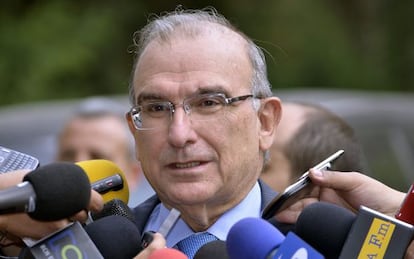Colombia tells FARC leaders it will not respond to threats
The Colombian government’s negotiator reacts to the FARC’s announcement that it will reveal “the truth” of what happened in Havana

A crisis threatens the peace process between the Colombian government and the Revolutionary Armed Forces (FARC) after the leader of the guerrilla group, Timoleón Jiménez -alias Timochenko-, sent a letter this Wednesday to President Manuel Santos with various complaints about his remarks at the United Nations General Assembly. During his speech, Santos said that negotiations should pick up speed because the Colombian people do not have “infinite patience.”
In the letter, Timochenko calls Santos' remarks before the international community "a well-thought out media offensive against us" and announced that his men would prepare a report in which they will detail what happened at the negotiation table -something that would break the pledge of confidentiality that both parties signed when they opened dialogue on November 19, 2012.
"Our only goal is to tell the country and the world the truth of what happened," wrote FARC's number two. "I have decided to order our spokespeople in Havana to prepare an report for the Colombian people. We have a great responsibility to them and so much rhetoric does damage, Santos," he continued.
The government responded immediately. Its chief negotiator Humberto de la Calle said Thursday morning in Bogotá that the FARC's position is "frankly incomprehensible."
With regards to the supposed report, De la Calle said that the confidentiality agreement was signed in order to safeguard the peace process" and that publishing what the FARC is calling "the truth" does not amount to a threat for the government. The government spokesperon also said that the best way to lock in the agreements signed at the peace talks in Havana would be to let the Colombian people endorse them through a mechanism to be agreed upon by the FARC and government. "That would be the best way to make sure everything is open and that the Colombian people are the ones who decide," De la Calle said.
In his letter, Timochenko also complained that the government limits itself to the six points on the agenda negotiated in such a manner that makes it seem that "only what they bring to the table is worthy of consideration." De la Calle responded that what hurts the FARC is precisely the fact that the government has remained faithful to the talks' agenda which includes the agrarian issue, the FARC's potential political participation, an end to to the conflict, drug trafficking, the plight of victims and the endorsement of the agreements. "This agenda is the key, the spine of what happens in Havana," De la Calle said. He added that the government will return to Cuba on October, 3 to hold another round of talks as scheduled.
According to what Timochenko wrote he disagrees. "If peace is about building bridges between opponents, the economic and democratic models, which are the true causes of the social and armed conflicts, must be modified." The FARC leader also mentioned what he calls "unilateral impositions" or the Legal Framework for Peace, a legislative measure approved by Congress, that will facilitate the design of a transitional judicial model that will satisfy the victims while promoting peace. This framework also includes legislation currently in Congress that will call for a referendum on election day to give Colombians the chance to endorse or not the Havana agreements.
In reference to speeding up the peace process with deference to the patience of the Colombian people, Timochenko wrote that what's happening is that Santos is running out of time "to define his candidacy for re-election and he is obviously eager to show off a peace treaty to the country." At the end of the letter, the FARC leader got tougher, telling Santos that he is delirious if he believes that he can "bend us with grunts. We are too old for that. The key is consensus, in changing that arrogant and stingy attitude."
After 11 months of talks in Havana the parties have only agreed on one point -on the agrarian issue- out of six. The second point on the agenda, the FARC's political participation, has not seen much progress. Colombian analysts say the negotiations are slugging through a bad patch.
Translation: Dyane Jean François
Tu suscripción se está usando en otro dispositivo
¿Quieres añadir otro usuario a tu suscripción?
Si continúas leyendo en este dispositivo, no se podrá leer en el otro.
FlechaTu suscripción se está usando en otro dispositivo y solo puedes acceder a EL PAÍS desde un dispositivo a la vez.
Si quieres compartir tu cuenta, cambia tu suscripción a la modalidad Premium, así podrás añadir otro usuario. Cada uno accederá con su propia cuenta de email, lo que os permitirá personalizar vuestra experiencia en EL PAÍS.
¿Tienes una suscripción de empresa? Accede aquí para contratar más cuentas.
En el caso de no saber quién está usando tu cuenta, te recomendamos cambiar tu contraseña aquí.
Si decides continuar compartiendo tu cuenta, este mensaje se mostrará en tu dispositivo y en el de la otra persona que está usando tu cuenta de forma indefinida, afectando a tu experiencia de lectura. Puedes consultar aquí los términos y condiciones de la suscripción digital.








































